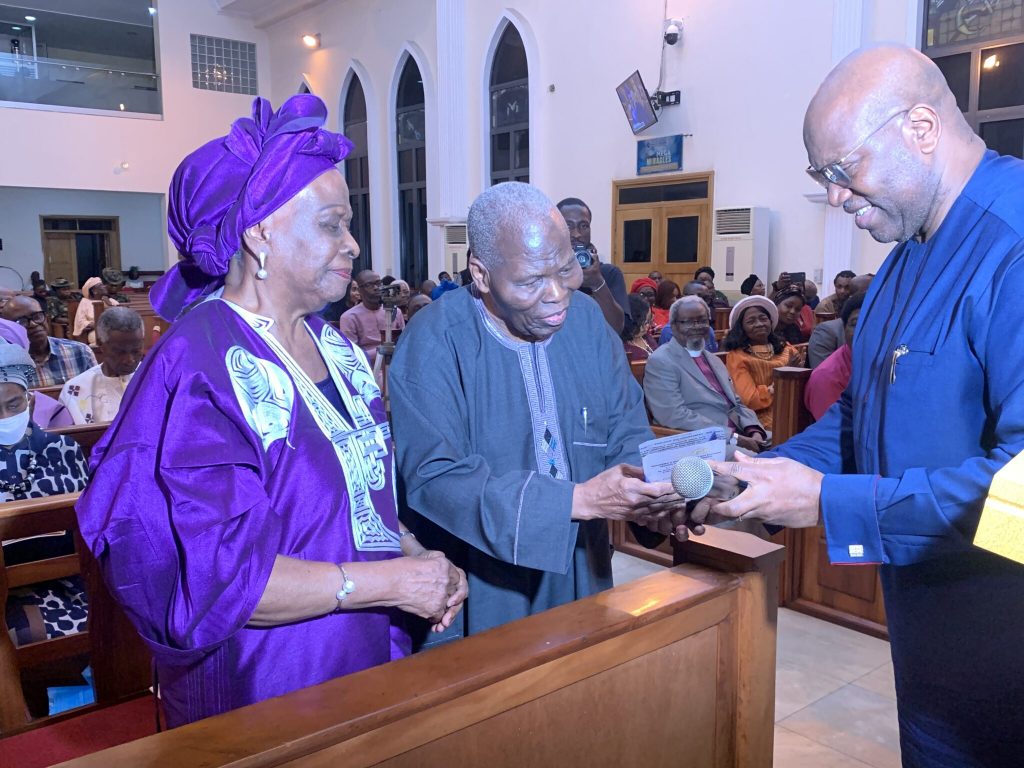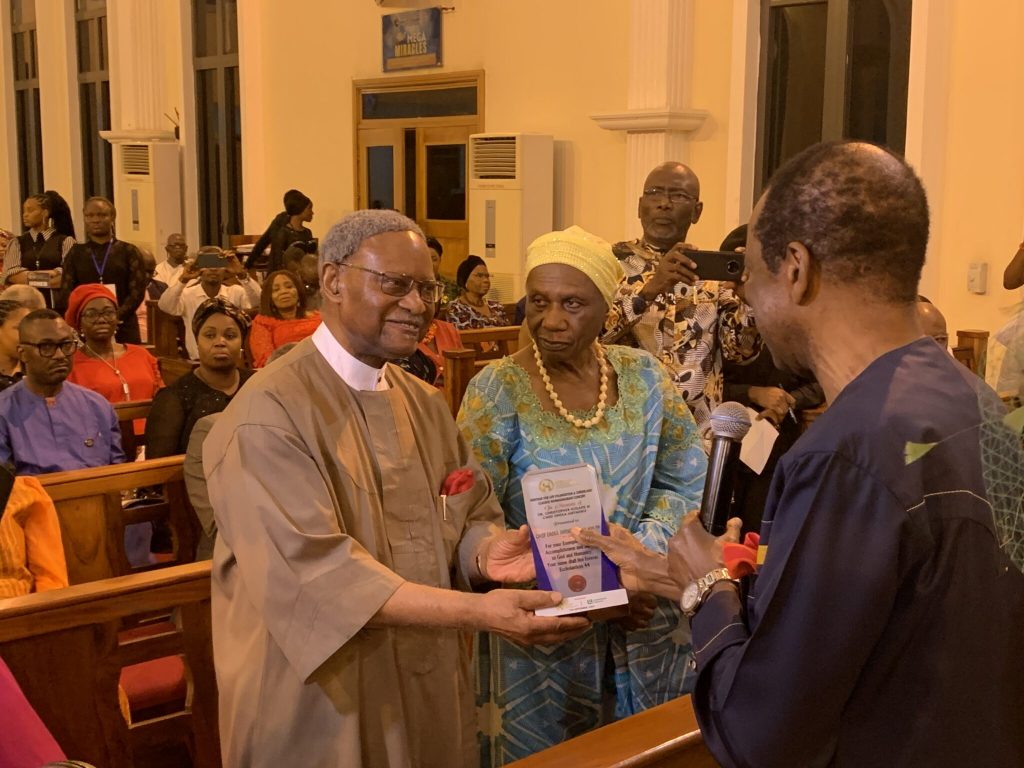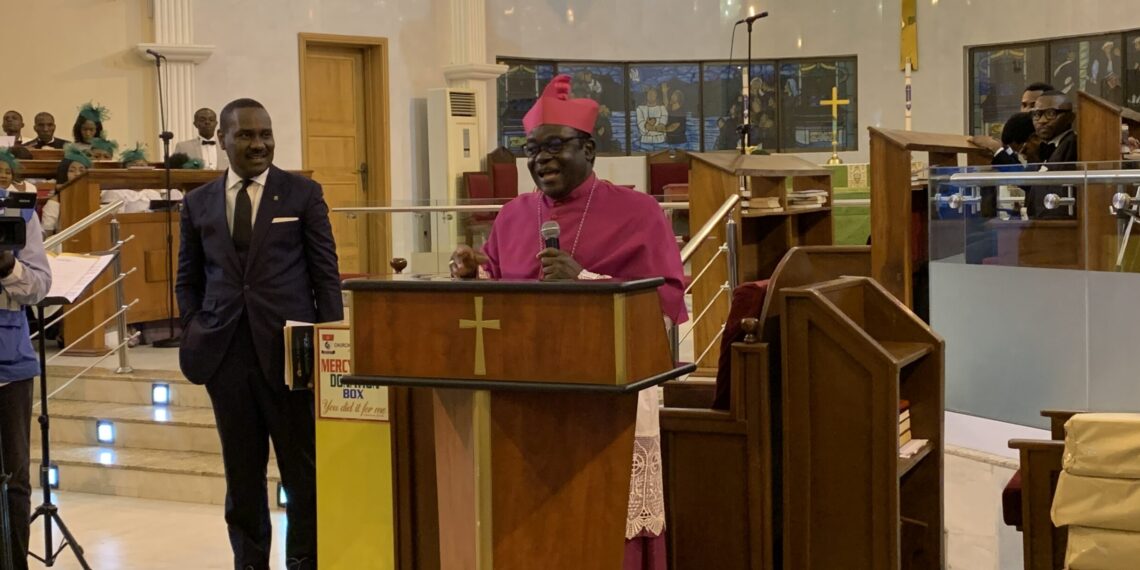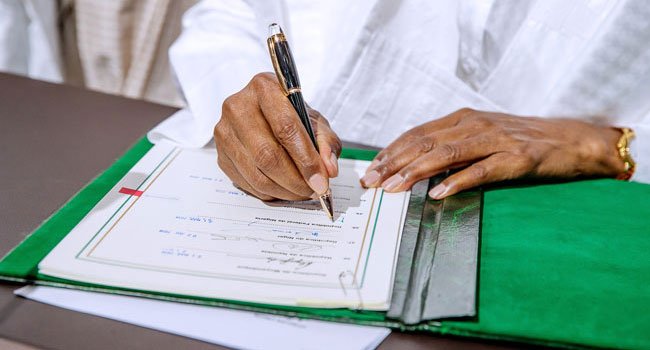The Archbishop of Sokoto Diocese of the Catholic Church, Hassan Kukah, says the current “quarrelsomeness” in Nigeria is a consequence of the ignorance of the younger generation about the history of the country.
Mr Kukah stated this in Lagos on Thursday evening at an event organised to honour two eminent Nigerians, Christopher Kolade and Emeka Anyaoku.
Mr Kolade, a former Nigeria high commissioner to the United Kingdom; and Mr Anyaoku, a former Secretary-General of the Commonwealth, were celebrated at the ‘Nonagenarian Concert & Presentation of the book titled: The Spirit of our treasures’ at the Church of Nativity Auditorium, in Ikoyi

The event was put together by the Heritage for Life Foundation to celebrate the duo whose lives the organisers said have set a positive example for Nigerians to emulate.
The foundation secretary, Lemuel Iyalla, said that the book is centered around the experiences of the nonagenarians who became successful while upholding great virtues and values.
Keynote speech
Delivering the keynote address at the event, Mr Kukah spoke on the challenges of nation-building in Nigeria.
“l accept all the accolades that have been poured on the lives of these wonderful men but I think we must also take cognisance of the fact that for building a nation, the challenges are far more than we can understand and the success of the challenges lie in if we use relay race as a metaphor. Because no matter how good you are as a relay team, your success depends on the quality of your collaboration and cooperation and how successfully we pass the baton,” Mr Kukah, said.
The cleric said the challenge before Nigerians is how to hold the collective narratives of their nation today.
“And yet there is no greater guide than history because without history, our lives will be an endless, frustrating chain of accusations and counter accusations; ball passing, praise singing and condemnation.
“And yet, in reality history is a contest of ideas, because it continues with a culture of interrogation and the more we interrogate the events of history, the better it is for us. But of course, if this interrogation is not sustained, memory lapses.”
The bishop said it is not true that history has been taken out of the Nigerian syllabus.
“The late Professor Obaro Nkime, who was the president of the Historical Society of Nigeria,
perhaps one of the world’s greatest historians, actually did say that nobody took history out of a syllabus,” he said.
“But what happened was that over time in the 1990s, as the banks with this artificial prosperity made in Nigeria, fewer and fewer and fewer young people decided they wanted to read history. People who are looking for courses that will help them in future.
“What I was saying was that actually, it was a deliberate decision by young people to gravitate towards the kind of courses that were worthy’ and we have ended up with a generation that is quite ignorant about the history of our country and that has tremendous consequences for us; how we see ourselves, how we define ourselves, and the culture of quarrelsomeness that have become part and parcel of our society today.”
Biography of the nonagenarians
Mr Kolade who will turn 91 in December was born in 1932 in ldo Faboro in Ekiti state to devout Christian parents, Reverend Abraham and Lydia Kolade.
He started his early education at Christ School in Ado Ekiti in 1945 after which he proceeded to Government College, Ibadan on a government scholarship and graduated with the legendary class of ‘46, which produced several notable Nigerians.
He started his career as an education officer at Government College, Ughelli, Delta
State. He moved on to become the first education officer in the region and was later appointed as Western Region Controller of the Nigerian Broadcasting Corporation (NBC) and later moved to the Nigerian Television Service (NTS) where he eventually rose to become the DG of the Nigerian Broadcasting Corporation at the age of 40.
The father-of-two was later to join Cadbury Nigeria PLC and eventually rose to become the CEO.
His retirement as Chairman of Cadbury was described by many as the end of an era in Nigerian business. Mr Kolade joined the faculty of the Lagos Business School until his appointment in 2001, as Nigeria’s High Commissioner to the United Kingdom.
On his part, Mr Anyaoku was elected third Secretary-General of the Commonwealth by Heads of Government at their meeting in Kuala Lumpur in 1989 and took office in July 1990 and served, after re-election, for two terms of 5 years each up to 2000.
He was born in 1933 and educated at University College, Ibadan, where he studied classics as a college scholar, graduating with a London University honours degree in 1959.
The father-of- four was Nigeria’s Foreign Minister in 1983 before the military coup d’etat at the end of that year.
Mr Anyaoku has had extensive international exposure and service. Among his many groundbreaking achievements; he was the first African Chief Executive of a global inter-governmental organisation before Boutros Boutros-Ghali and Kofi Annan at
the United Nations; the first African International President of the World Wide Fund for Nature (WWF)- an office previously held by HRH Prince Philip Duke of
Edinburgh; the first African to have a professorial chair named after him in a British University; and the first African Trustee of the British Museum.
Tributes to Anyaoku
In his tributes to Mr Anyaoku, former President Olusegun Obasanjo described him as
“detribalised” Nigerian.

“At the time that he came here to marry Bunmi, it was not fashionable,” he wrote in his tributes.
“He believes in the world that he lives in. He made a success of the time when he served as an officer in the foreign service under Chief Simeon Adebo, who was also a man of sterling qualities, in every sense. He is a hard worker.
“I saw it when he was rising through the ranks of the Commonwealth Secretariat to become substantive head of that secretariat. I worked with him when I was a member of the Eminent Persons Group in Africa.
“He was with us. We had occasions when the two co-chairmen, Malcolm Fraser and myself did not see things in the same light. Emeka acted as arbitrator. He’s that sort of man, a peacemaker
“He’s a lover of humanity generally, but he is also a lover of Nigeria. Many people don’t know, but we live near each other. His Abeokuta home is a walking distance from mine and sometimes when he’s in town. I simply walk over to see him.
Yakubu Gowon, a former head of state, said the retired diplomat is a man of exceptional qualities who exemplifies what a good Nigerian should be.
“He has led an exemplary life in everything. As Commonwealth Secretary General, he made Nigeria proud by the way he conducted himself and the affairs of the Commonwealth, to the glory of God, the honour of his country and that institution, the Commonwealth,” Mr Gowon wrote.
On his part, President Bola Tinubu called the first African Trustee of the British Museum a “signpost of what is best and possible about Nigerians and Nigeria as a country.”
He wrote that Mr Anyaoku demonstrates “beyond doubt that Nigeria is a blessed and not a cursed country and that if true leadership exists, Nigeria can produce a dozen and more Anyaokus.

Tributes to Kolade
In her tribute, a former president of the National Post-Graduate Medical College of Nigeria, Ajesola Majekodunmi, said her path crossed with the former high commissioner of Nigeria to the UK in 2000 “where we met at Ogudu GRA where we both reside.
“Soon, we were both elected into the Board of Trustees of the Residents Association and that brought us closer.
“He was unanimously elected as our Chairman of BOT. The way he conducted our meetings and related with the members showed his wealth of experience garnered from the board room. He is a good listener, disciplinarian and leader who gave a good summary of our discussions at the end of each meeting. We held him in high esteem.
“Soon Dr Kolade became my confidant with whom I could chat or discuss any matter. He was knowledgeable and can never be found wanting in any field. Indeed in time of trouble, by the time you finished your discussion with Dr. Kolade, he would have put smiles on your face.
“He has a way of restoring your self-confidence, bringing out the best in you.”
In his goodwill message to Mr Kolade, Canon Ogundipe, a cleric said the celebrant’s life is worthy of emulation.
“Indeed Dr Christopher Olusola Kolade’s life is worthy of emulation by all. Like Daniel in the Bible, he remain impeccable in his services both to God and human,” he said.
“He worked in the public notices and remain uncorrupted. A faithful servant in the Church of God who served as an organist for several years free of charge.
“No wonder, he was made a Lay Canon of the Cathedral of the Holy Spirit in the Diocese of
Guildtord, England. There is no better way to make it known to the world and the coming generation than in writing a book such as ‘The Spirit of Our Treasures’.”
Yemi and Titi Akinsanya said that in a world “often bereft of role models,” Mr Kolade’s legacy “will not be of wealth or worldly achievements, of which he has more than enough.
“But, much more than these, it will be a spirit consistently radiating a sense of unwavering goodness and a life that inspires those around him to be better.”
Premium Times







